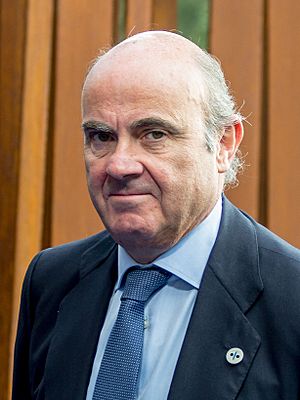Luis de Guindos facts for kids
Quick facts for kids
Luis de Guindos
|
|
|---|---|

De Guindos in 2017
|
|
| Vice-President of the European Central Bank | |
| Assumed office 1 June 2018 |
|
| President | Mario Draghi Christine Lagarde |
| Preceded by | Vítor Constâncio |
| Minister of Economy, Industry and Competitiveness | |
| In office 21 December 2011 – 7 March 2018 |
|
| Prime Minister | Mariano Rajoy |
| Preceded by | Elena Salgado (Economy and Finance) |
| Succeeded by | Román Escolano |
| Minister of Industry, Energy and Tourism | |
| Acting 16 April 2016 – 4 November 2016 |
|
| Prime Minister | Mariano Rajoy |
| Preceded by | Jose Manuel Soria |
| Succeeded by | Álvaro Nadal |
| Personal details | |
| Born | 16 January 1960 Madrid, Spain |
| Political party | Independent |
| Education | CUNEF University |
Luis de Guindos Jurado (born January 16, 1960) is a Spanish politician. Since 2018, he has been the Vice-President of the European Central Bank. This is one of the most important banking jobs in Europe.
Before that, he was Spain's Minister of Economy, Industry and Competitiveness from 2011 to 2018. In this role, he was in charge of managing Spain's money and businesses.
Contents
Early Life and Education
Luis de Guindos was born in Madrid, Spain. He went to CUNEF University, where he earned a degree in Economics and Business. This prepared him for a future career working with money and the economy.
Career Journey
Early Government Work
In the late 1990s, de Guindos began working for the Spanish government. He held several important advisory roles related to the economy. An advisor is someone who gives expert advice to leaders.
From 2002 to 2004, he was the Secretary of State for Economic Affairs. During this time, he played a key part in helping Spain adopt the euro as its currency. This was a major change for the country's economy.
Working in the Private Sector
After leaving the government in 2004, de Guindos worked for private companies. This is often called the "private sector." He was an advisor for Lehman Brothers in Europe and later worked for the finance department of Pricewaterhouse Coopers.
He also taught finance at the IE Business School in Madrid. These jobs gave him more experience in the world of business and finance before he returned to politics.
Spain's Minister of Economy
In December 2011, de Guindos became Spain's Minister of Economy. He took the job during a difficult time for Spain and other European countries, known as the European debt crisis.
His main task was to help Spain's economy recover. He helped negotiate a €100 billion rescue plan from the European Union for Spanish banks that were in trouble. He also made major changes to the banking system and the job market. These changes were praised by other European countries for helping Spain get back on track.
In 2016, he also temporarily took on the role of Minister of Industry, Energy and Tourism after the previous minister resigned.
Vice-President of the European Central Bank
In 2018, de Guindos was chosen for a top job at the European Central Bank (ECB). The ECB is like the main bank for all the countries that use the euro. As Vice-President, he helps make important decisions about money and banking for millions of people across Europe.
To get the job, he had to be approved by the European Parliament. A majority of its members supported him, and he officially started his new role on June 1, 2018.
Other Activities
Throughout his career, de Guindos has been a member of many important international organizations. These groups work together to solve global problems. Some of them include:
- European Investment Bank (EIB)
- European Stability Mechanism (ESM)
- International Monetary Fund (IMF)
- World Bank
Personal Life
De Guindos is married and has two children. He is a practicing Roman Catholic. In his public life, he has expressed his support for certain social issues.
See also
 In Spanish: Luis de Guindos para niños
In Spanish: Luis de Guindos para niños
 | Isaac Myers |
 | D. Hamilton Jackson |
 | A. Philip Randolph |

